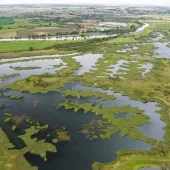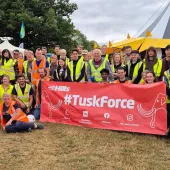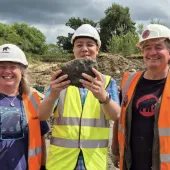BMAPA recognizes excellence in archaeological reporting

Winners announced in British Marine Aggregate Producers Association’s annual Archaeology Awards
THREE winners of the British Marine Aggregate Producers Association (BMAPA) annual Archaeology Awards have recently been announced.
‘The Awards recognize best practice in applying an archaeological reporting protocol developed in partnership between the marine aggregate industry and Historic England.
BMAPA director Mark Russell said: ‘Staff working in the marine aggregate industry, at wharves or on board dredgers, are aware they can encounter archaeological finds during their day to day work, so the existence of a reporting protocol is vital to ensuring any items of potential heritage interest are reported.
‘Their vigilance ensures that any finds of potential archaeological importance discovered across the UK marine aggregate industry’s operations can be reported to heritage experts so their significance can be assessed.’
Commenting on the awards, Chris Pater, head of marine planning at Historic England, said: ‘For more than a decade the marine minerals industry has demonstrated a commitment to our nation’s heritage through its awareness and recording methods.
‘These awards directly recognize how we can all contribute to our understanding of the past by reporting what might be found at wharves or while at sea.’
The 2015 BMAPA Annual Archaeology Award winners are:
- Best Attitude at a Wharf – Burnley Wharf (Tarmac) – for reporting more than twice as many finds during the protocol year (20 in total) as any other wharf.
- Best Attitude on a Vessel – Arco Dart (Hanson Aggregates Marine) – for reporting a fragment of unusual sandstone recovered from a cargo loaded in Area 472 in the Bristol Channel.
- Best Find – underwater swimmer’s breathing apparatus – a brass mouthpiece with twin Dunlop rubber hoses, used by naval clearance divers during the Second World War. The find (pictured) was discovered at Tarmac’s Bedhampton Wharf in a cargo dredged from Area 372/1, to the east of the Isle of Wight.
The archaeological reporting protocol continues to be delivered through an implementation service provided by Wessex Archaeology and co-funded by BMAPA and The Crown Estate.
The service allows finds recovered by industry staff to be identified and assessed for their significance by heritage experts, and, where necessary, for appropriate mitigation to be introduced on production licence areas to protect previously unknown sites of importance.
Since the protocol was introduced in 2005, more than 380 separate reports have been filed by marine aggregate industry staff (53 in 2014/15), covering in excess of 1,100 individual items (c.79 in 2014/15).
Finds reported range from animal remains from the Palaeolithic period, through to airframe and machine gun parts from WWII aircraft.
The implementation service includes an annual report which details every find reported during the year, commenting on trends emerging over time.
To support the practical delivery of the protocol, an awareness programme to encourage its use among industry staff continues to be funded through a partnership approach between BMAPA, The Crown Estate and Historic England.
The programme involves site visits by maritime archaeologists to provide industry staff with the knowledge and confidence to identify and report items of potential archaeological interest that may be found among dredged cargoes, as well as the production of twice-yearly ‘Dredged Up’ newsletters.









